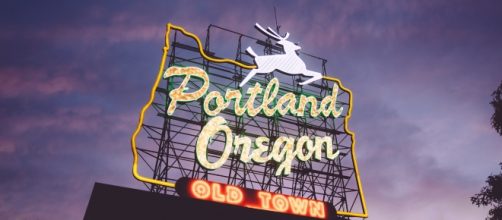Portland, Oregon, is a bastion of Liberal politics and progressive worldviews, tolerance resting at the center of the city's moral code. Many Americans were shocked, then, when Jeremy Christian stabbed and killed two men on a Portland-area train on May 27. Their offense? Intervening as Christian spewed slurs toward two female passengers dressed in conservative Muslim attire.
Christian's social media sites have since revealed a life filled with mental health issues and White Supremacist activism. But his crimes have also drawn attention to the city's own racially charged history.
Portland is a sort of urbanized irony; its left-leaning present is rooted in an intolerant past.
Portland: America's Whitest City
More than 70 percent of Portland's 630,000 residents are white, while only 6 percent are black. Compare this to the similarly sized Detroit, where more than 80 percent of the residents are black (and home to its own significant Muslim-American conflicts).
The predominance of white residents in Portland has stirred significant debate about systemic racism in the city. Portland's black residents not only rank lower than their white counterparts in education and economic measurements, but they also fare worse than most other blacks across America. It's not only tough to be black in Portland, it's tougher to be black in Portland than just about any other city.
“Portland is a progressive city," Mayor Ted Wheeler told the L.A. Times. "But we can’t assume that the legacy of the past isn’t impacting the present."
"foundation of #Oregon, and in fact the whole Pacific Northwest, was as a racist white utopia," @WalidahImarisha #Portland pic.twitter.com/ahlpwSV7h6
— Mona Eltahawy (@monaeltahawy) June 1, 2017
Portland: Past & Present
Oregon was founded as a white promised land. In fact, the territorial leaders promised white, married males several hundred acres of free land for moving there. More striking, however, was the naked animosity toward blacks, slave or free.
In 1857, Oregon ratified a state constitution that outlawed blacks from living or holding property within its borders.
It was the first state to officially make it illegal to be black and a resident. Violators faced the very real threat of public floggings. Federal intervention several years later would overturn the exclusion of blacks, but the previous laws spoke to the commitment on the part of Oregon's founders in keeping it free from racial diversity.
"The answer to why aren't there more black people in Oregon is actually very clear and very simple," said Walidah Imarisha, an authority on the black experience in the Pacific Northwest, during a 2015 Portland State University lecture. "Because Oregon didn't want black people here. Oregon actually conceptualized of itself as a white homeland."
Imarisha and other black studies educators argue Portland's present lack of diversity hints at a lack of progress since the 19th Century.
Rather than codified racism, they maintain, prejudice is evident in the redirection of resources from minority communities to white, liberal havens, like Portland. Where some see reason for celebration in the city's green spaces and award-winning urban planning, Imarisha sees shadows of the city's racist underpinning.
"The excess resources that were used to create this sort of liberal landscape... all of that comes from the direct neglect of resources going to communities of color," said Imarisha. "Those resources were hoarded away from those communities who were contributing into it."
Even seemingly well-meaning efforts at urban renewal have divested Portland's communities of color. The Albina neighborhood, for example, served as an anchor of black culture beginning in mid-1900's.
Efforts to raise the economic profile of the neighborhood, including construction of a sports arena and resulting highways, simply divided the neighborhood between the affluent and poor, white and black.
The way forward to genuine diversity, said Imarisha, requires empowering marginalized communities by supporting their own leaders: "People of color don't need saviors, they need allies."


